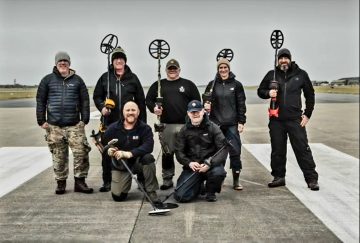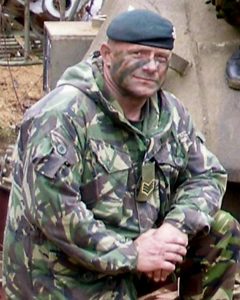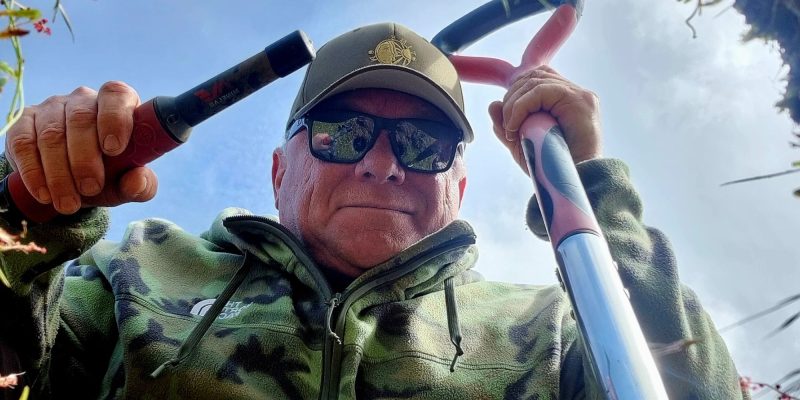On Salisbury Plain in the middle of Saxon England, a soldier was buried with his battle-worn sword. This century, however, another military man has found a different use for that weapon of war, to help fix his mental health.
Paul Hemingway served in the British Army for 25 years, he got involved with the therapeutic archaeology project, Operation Nightingale 10 years ago after a friend of his recommended he join after knowing he was going through a hard time mentally.
“We all react differently when we find something, to hold something in your hand knowing a person so long ago dropped it, the connection is unbelievable,” he outlines.
“It’s like fishing in a field. I didn’t think I would be addicted to digging holes but here we are.”
Operation Nightingale’s unique initiative is enabling veterans and soldiers to swap their rifles for metal detectors. Using archaeology as both therapy and a way to unearth forgotten history.
The project supports veterans struggling with mental health challenges or physical injuries by involving them in important archaeological digs on Salisbury Plain. The charity not only helps participants tackle personal struggles but also engages them in teamwork to make meaningful discoveries. It can be hard to believe that uncovering skeletal remains and broken pots can provide solace and comfort.

Founded in 2011 by Richard Osgood, an archaeologist for the Ministry of Defence, Operation Nightingale began as an opportunity for people to use archaeology as a method of recovery after being in testing situations. The project initially launched with the Rifles regiment as part of their rehabilitation- the project has since expanded to include veterans and personnel from all aspects of the British Military.
Richard Osgood ensures that Operation Nightingale involves participants with a wide range of skills, highlighting that archaeology has something for everyone. He explains, “One of the things it does enable is a fantastic social atmosphere where people can speak to each other who have been through similar experiences in a non-judgemental environment.”
The programme’s good results aren’t just from word of mouth. They use a questionnaire that is used by National Health Service, to analyse individuals’ anxiety and depression. There is a series of questions given to individuals before and after they start the programme.
The ex-military group work on a huge range of sites on Salisbury Plain, many of them being well-preserved within the Ministry of Defence training area.
Paul couldn’t believe that he was being asked to dig holes on Salisbury Plain where he used to train with the army. After giving it a shot, he has never looked back.

“It’s very similar to serving again because you’re hanging around with a bunch of ex-service personnel and you can open up to each other because we have all been through the same sort of thing.
“To be able to get together and laugh and also learn something about archaeology is a fantastic opportunity.
“I have never looked back; I am always waiting for the next date to dig. It’s 100% therapy and does work.”
Post-traumatic stress disorder (PTSD), is an anxiety disorder that can develop after witnessing or personally experiencing a traumatic event. This is more common for people who have served in the military. Symptoms can include frightening flashbacks, negative emotions and trouble concentrating.
Paul spoke about his own experience saying, “Archaeology is giving people a different outlook on life, hardly anyone who turns up has ever touched a trough so to learn from professionals takes your mind off everything and past traumas.”
Mental health remains a crucial issue, with a particular stigma surrounding men opening up about their feelings, especially after leaving the military. Paul highlighted the importance of joining the group, stating, “It helps you a lot, you can laugh. It’s like therapy as well as learning new skills.”
The group has proven to be invaluable in supporting veterans with mental health from their military experiences, but its impact goes beyond that. It has also shown to be a lifeline for those facing other real-life challenges, such as battling illness. Paul had already become a member of the archaeology group when he then faced an eight-month battle with cancer.
“The comradeship in Nightingale is unbelievable,” he recalls. “The amount of support I received from everyone—I just couldn’t believe it. It carried me through. When it’s happening, you don’t know which way it’s going to go, but I tried to laugh through it with everyone involved in the group.”
“I didn’t beat cancer, we did.”


 AstraZeneca scraps £450m UK investment plan
AstraZeneca scraps £450m UK investment plan